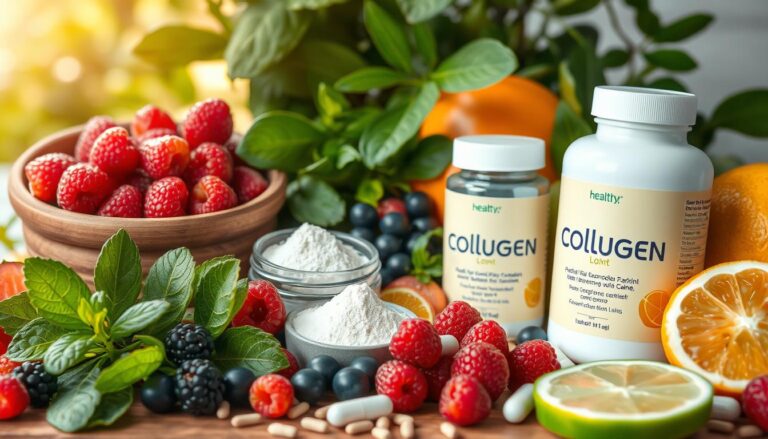Boost Your Immune System with the Best Vitamins
A strong immune system is essential for maintaining overall health and well-being. With the right combination of vitamins and nutrients, you can support your immune system and reduce the risk of illnesses. The best vitamins for boosting immune system, including immune system support supplements, can help you achieve optimal health.
Our comprehensive guide will explore the top immune-boosting vitamins, such as vitamin C, vitamin D, and zinc, and provide tips on how to incorporate them into your diet. By understanding the importance of these vitamins, you can make informed decisions about your health and well-being.
Introduction to Immune System Support
By choosing the right immune system support supplements, you can enhance your body’s natural defense mechanisms and reduce the risk of illnesses. The best vitamins for boosting immune system can help you achieve optimal health and well-being.
Key Takeaways
- Support your immune system with the right combination of vitamins and nutrients
- Choose the best vitamins for boosting immune system, including vitamin C, vitamin D, and zinc
- Incorporate immune system support supplements into your diet for optimal health
- Understand the importance of vitamins in immune function
- Make informed decisions about your health and well-being with our comprehensive guide
- Reduce the risk of illnesses with the right immune-boosting vitamins
Understanding Your Immune System’s Basic Functions
The immune system is a complex network of cells, tissues, and organs that work together to protect the body against infections and diseases. To maintain optimal health, it’s essential to understand how the immune system functions and what factors can affect its performance. A well-functioning immune system relies on natural immune system boosters, such as a balanced diet, regular exercise, and adequate sleep.
When it comes to supporting immune function, top immune system boosting vitamins play a crucial role. These vitamins help to strengthen the immune response, reducing the risk of illness and infection. Some of the key components of immune response include white blood cells, antibodies, and the lymphatic system.
Signs of a weakened immune system can include frequent illnesses, fatigue, and slow wound healing. To maintain a healthy immune system, it’s essential to incorporate natural immune system boosters into your daily routine, such as a balanced diet rich in fruits, vegetables, and whole grains. Additionally, staying up-to-date on recommended vaccinations and practicing good hygiene can help to support immune function.
| Immune System Component | Function |
|---|---|
| White Blood Cells | Fight infection and disease |
| Antibodies | Neutralize pathogens and foreign substances |
| Lymphatic System | Removes waste and toxins from the body |
By understanding the basic functions of the immune system and incorporating top immune system boosting vitamins and natural immune system boosters into your daily routine, you can help to support immune function and maintain optimal health.
Best Vitamins for Boosting Immune System: Essential Guide
When it comes to supporting immune function, vitamins play a vital role. A well-balanced diet that includes immune system vitamins and supplements can help strengthen immune response. The best immune support vitamins, such as vitamin C, vitamin D, and zinc, are essential for optimal immunity.
A healthy immune system relies on a combination of nutrients to function properly. Key vitamins and minerals help to support immune function, reducing the risk of illness and infection. By incorporating the right vitamins into your diet, you can help to boost your immune system and stay healthy.
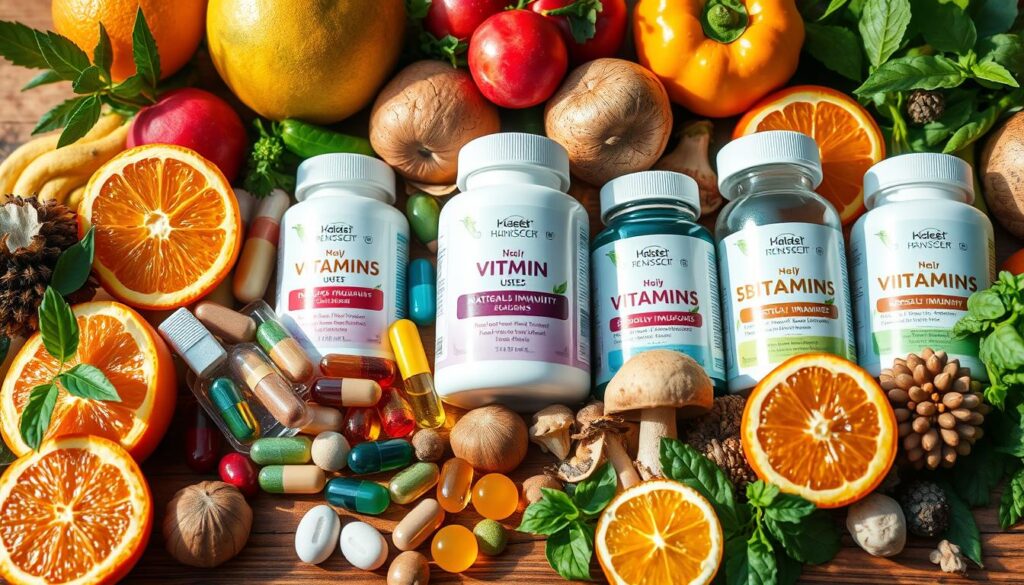
To ensure you’re getting the necessary vitamins for immune support, consider the following:
- Vitamin C: essential for the production of white blood cells
- Vitamin D: important for regulating immune cell function
- Zinc: plays a crucial role in immune cell activation and function
By understanding the role of vitamins in immune function and incorporating the best immune support vitamins into your diet, you can help to support your immune system and stay healthy.
Vitamin C: The Immune System’s Best Friend
Vitamin C is a powerful antioxidant that plays a crucial role in immune health. It helps protect cells from damage and supports the production of white blood cells, which are vital for fighting off infections. A diet rich in vitamin C can help keep your immune system strong and resilient.
Some of the best food sources of vitamin C include citrus fruits, strawberries, bell peppers, and broccoli. You can also consider taking vitamin C supplements after consulting with a healthcare professional. The recommended daily intake of vitamin C varies from 60 to 90 milligrams per day for adults.
To incorporate more vitamin C into your diet for immune health, try the following:
- Eat at least one serving of citrus fruits or strawberries per day
- Add bell peppers and broccoli to your meals
- Consider taking a vitamin C supplement after consulting with a healthcare professional
By making these simple changes to your diet and lifestyle, you can help support your immune health with vitamin C and reduce the risk of illnesses. Remember to always consult with a healthcare professional before making any significant changes to your diet or supplement routine.
The Power of Vitamin D in Immune Defense
Vitamin D is a crucial component of the best vitamins for boosting immune system, playing a significant role in regulating the immune system and preventing infections. It is essential to understand the importance of vitamin D for immune defense, including the role of sunlight exposure in vitamin D production.
When it comes to immune system support supplements, vitamin D is often overlooked, but it is a vital nutrient that helps to activate immune cells, such as macrophages and T-cells, which are essential for fighting off pathogens. The recommended vitamin D intake levels vary based on factors such as age, skin color, and geographic location.
Sunlight Exposure and Vitamin D Production
Sunlight exposure is a natural way to produce vitamin D, as the sun’s ultraviolet B (UVB) rays trigger the production of vitamin D in the skin. However, the amount of vitamin D produced through sunlight exposure can be limited, especially during the winter months or for individuals with limited sun exposure.
Recommended Vitamin D Intake Levels
The recommended daily intake of vitamin D varies from 600 to 800 IU (International Units) per day, depending on the individual’s age and health status. It is essential to consult with a healthcare professional to determine the best vitamin D intake level for your specific needs.
Signs of Vitamin D Deficiency
Vitamin D deficiency can lead to a range of health problems, including weakened immune function, increased risk of infections, and impaired bone health. Some common signs of vitamin D deficiency include fatigue, muscle weakness, and mood changes.
Incorporating the best vitamins for boosting immune system, including vitamin D, into your daily routine can help to support immune function and overall health. By understanding the importance of vitamin D and maintaining adequate levels, you can help to keep your immune system strong and resilient.
| Vitamin D Intake Level | Age Group |
|---|---|
| 600 IU/day | Adults 19-50 years |
| 800 IU/day | Adults 51-70 years |
| 800 IU/day | Adults over 70 years |
Zinc and Other Mineral Companions for Immunity
Zinc is an essential mineral that plays a crucial role in immune function, making it one of the top immune system boosting vitamins and natural immune system boosters. It helps to support the production of white blood cells and activate immune cells. A deficiency in zinc can lead to a weakened immune system, making it harder for the body to fight off infections.
In addition to zinc, other minerals such as iron and selenium are also important for immune function. These minerals can be found in a variety of foods, including lean meats, fish, and nuts. To ensure you are getting enough of these minerals, consider incorporating the following foods into your diet:
- Lean meats, such as chicken and turkey
- Fatty fish, such as salmon and tuna
- Nuts and seeds, such as almonds and sunflower seeds
By incorporating these foods into your diet and ensuring you are getting enough of the top immune system boosting vitamins and natural immune system boosters, you can help support your immune system and reduce your risk of illness.
B-Complex Vitamins: Supporting Your Defense System
B-complex vitamins are essential for a healthy immune system. They help produce white blood cells and activate immune cells. These vitamins are crucial for overall health and well-being.
When it comes to immune system vitamins and supplements, B-complex vitamins are some of the best immune support vitamins. They can be found in various food sources, including lean meats, fish, and whole grains.
Different B Vitamins and Their Immune Functions
- Vitamin B6: Helps produce white blood cells
- Vitamin B9 (Folic Acid): Essential for cell growth and development
- Vitamin B12: Plays a crucial role in the production of red and white blood cells
Food Sources Rich in B Vitamins
Some of the richest food sources of B vitamins include:
- Lean meats: chicken, turkey, and fish
- Whole grains: brown rice, quinoa, and whole wheat bread
- Legumes: lentils, chickpeas, and black beans
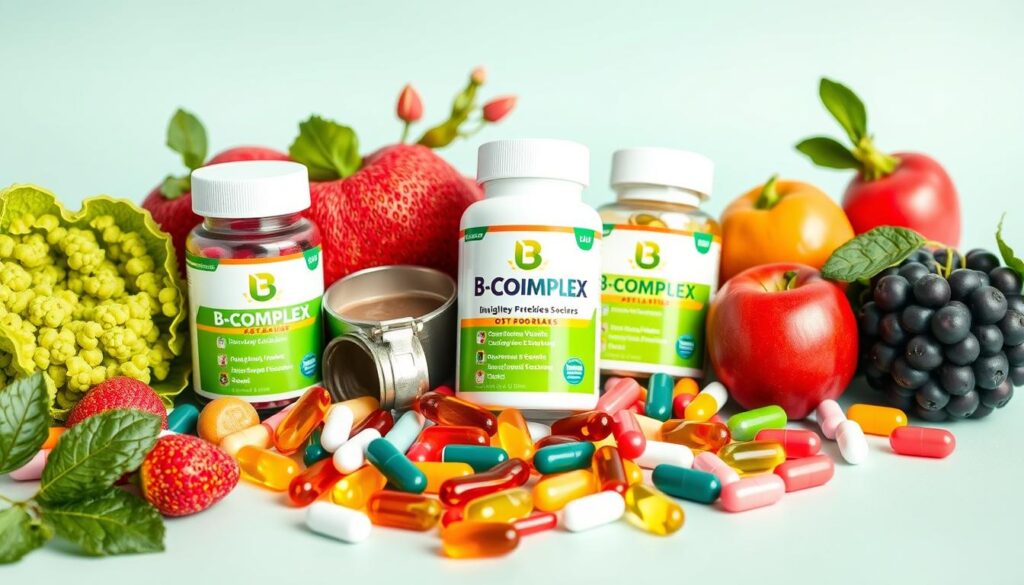
Supplementation Guidelines for B Vitamins
When choosing the best immune support vitamins, consider a B-complex supplement that includes all the essential B vitamins. Always follow the recommended dosage and consult with a healthcare professional before starting any new supplement regimen.
| Vitamin | Recommended Daily Intake |
|---|---|
| Vitamin B6 | 1.3-1.5 mg |
| Vitamin B9 (Folic Acid) | 400-500 mcg |
| Vitamin B12 | 2.4-2.6 mcg |
Natural Food Sources of Immune-Boosting Vitamins
A healthy diet rich in fruits, vegetables, and whole grains can provide essential vitamins and minerals for immune health. Eating a variety of foods can help ensure you get the best vitamins for boosting immune system function. Some of the top natural food sources of immune-boosting vitamins include citrus fruits, leafy greens, and nuts.
These foods are packed with vitamins A, C, and E, as well as minerals like zinc and iron, which are crucial for immune system support supplements. A well-balanced diet that includes these foods can help support immune function and reduce the risk of illness.
In addition to a healthy diet, some people may choose to take immune system support supplements to fill any nutritional gaps. It’s essential to consult with a healthcare professional before taking any supplements to ensure you’re getting the best vitamins for boosting immune system function.
Some examples of immune-boosting foods include:
- Citrus fruits like oranges and grapefruits
- Leafy greens like spinach and kale
- Nuts like almonds and walnuts
These foods can be easily incorporated into your diet to support immune health and provide the best vitamins for boosting immune system function.
Supplement Forms and Absorption Rates
When it comes to taking top immune system boosting vitamins, it’s essential to consider the different supplement forms and their absorption rates. This can help you make informed decisions about which supplements to take and when to take them for optimal effectiveness.
Natural immune system boosters, such as vitamins and minerals, can be found in various forms, including capsules, tablets, and powders. Each form has its own absorption rate, which can affect how well your body utilizes the nutrients.
Different Supplement Types Explained
- Capsules: often used for fat-soluble vitamins, such as vitamins A, D, E, and K
- Tablets: commonly used for water-soluble vitamins, such as vitamin C and B vitamins
- Powders: can be mixed with water or other liquids, often used for probiotics and other supplements
Best Times to Take Immune Vitamins
Timing is everything when it comes to taking immune-boosting vitamins. For example, taking vitamin C in the morning can help boost your immune system throughout the day. On the other hand, taking melatonin in the evening can help regulate your sleep-wake cycle and support immune function.
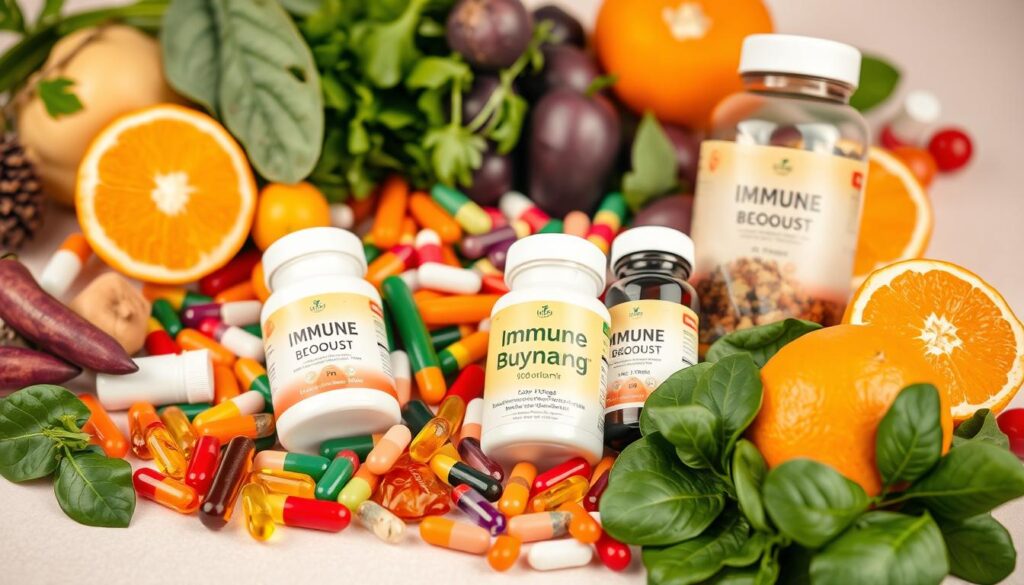
Potential Interactions and Precautions
When taking supplements, it’s crucial to be aware of potential interactions and precautions. For instance, taking high doses of vitamin C can interact with certain medications, such as blood thinners. Always consult with a healthcare professional before starting any new supplement regimen.
| Supplement | Recommended Dosage | Potential Interactions |
|---|---|---|
| Vitamin C | 60-90 mg per day | Blood thinners, diabetes medications |
| Vitamin D | 600-800 IU per day | Calcium supplements, certain medications |
Lifestyle Factors That Enhance Vitamin Effectiveness
When it comes to getting the most out of your immune system vitamins and supplements, lifestyle factors play a significant role. A healthy lifestyle can enhance the effectiveness of the best immune support vitamins, leading to a stronger and more resilient immune system.
Some key lifestyle factors to focus on include sleep, exercise, and stress management. Getting adequate sleep is crucial for immune function, as it allows the body to repair and recharge. Regular exercise can also boost the immune system by increasing the production of white blood cells, which help fight off infections.
Stress management is also essential, as chronic stress can weaken the immune system. Techniques such as meditation, yoga, and deep breathing can help reduce stress and promote overall well-being. By incorporating these lifestyle factors into your daily routine, you can maximize the benefits of your immune system vitamins and supplements.
Here are some tips to get you started:
- Establish a consistent sleep schedule to ensure you’re getting 7-9 hours of sleep per night
- Aim for at least 30 minutes of moderate-intensity exercise per day
- Try stress-reducing techniques such as meditation or yoga for at least 10-15 minutes per day
By combining a healthy lifestyle with the right immune system vitamins and supplements, you can give your immune system the support it needs to function at its best. Remember to always choose the best immune support vitamins and consult with a healthcare professional before starting any new supplement regimen.
| Lifestyle Factor | Benefits for Immune System |
|---|---|
| Sleep | Repairs and recharges the body, supports immune function |
| Exercise | Increases production of white blood cells, boosts immune system |
| Stress Management | Reduces stress, promotes overall well-being and immune function |
Common Mistakes When Taking Immune-Boosting Vitamins
When it comes to taking best vitamins for boosting immune system, there are several common mistakes to avoid. One of the most significant errors is not consulting a healthcare professional before starting any supplement regimen. This can lead to adverse interactions with medications or exacerbate underlying health conditions.
Another mistake is not choosing the right immune system support supplements. With so many options available, it’s essential to select a high-quality supplement that contains the necessary vitamins and minerals to support immune function. A well-informed decision can be made by researching and reading reviews from reputable sources.
Some additional mistakes to avoid include:
- Taking too high a dose, which can lead to toxicity or adverse effects
- Not following the recommended dosage instructions
- Not combining supplements with a healthy lifestyle, including a balanced diet and regular exercise
By being aware of these common mistakes, individuals can take best vitamins for boosting immune system safely and effectively, supporting their overall health and wellbeing. It’s also important to remember that immune system support supplements should not replace a healthy lifestyle, but rather complement it.
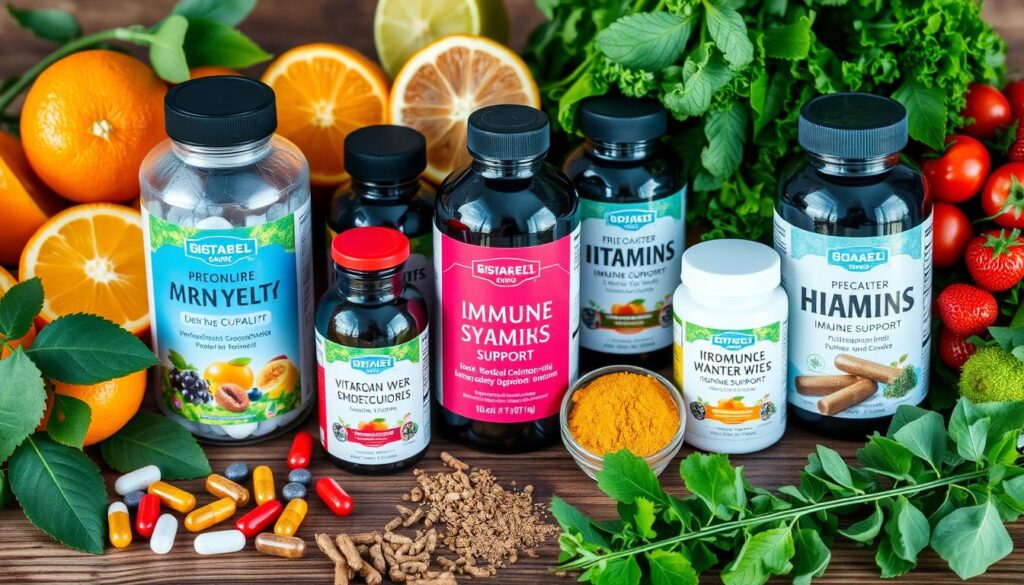
Conclusion: Creating Your Personal Immune-Boosting Strategy
In conclusion, building a personalized immune-boosting strategy is key to supporting your body’s natural defenses. By incorporating the top immune system boosting vitamins like vitamin C, vitamin D, and zinc into your diet, you can strengthen your overall health and resilience. Remember to also explore natural immune system boosters found in whole foods, and be mindful of proper immune-boosting vitamin supplements dosages to avoid potential interactions.
Your immune-boosting journey is unique, so listen to your body’s needs and adjust your approach accordingly. With the right combination of nutrient-rich foods, targeted supplements, and healthy lifestyle habits, you can empower your immune system and enjoy greater well-being. Embrace this opportunity to take charge of your health and cultivate a strong, adaptive defense system that will serve you well now and in the future.
FAQ
What are the best vitamins for boosting the immune system?
The best vitamins for boosting the immune system include vitamin C, vitamin D, and zinc. These vitamins play crucial roles in supporting immune function and strengthening the body’s defense against infections and diseases.
How do vitamins strengthen the immune system?
Vitamins support immune function in various ways. For example, vitamin C is a powerful antioxidant that helps protect cells from damage, while vitamin D regulates the immune system and prevents infections. Zinc is essential for the production of white blood cells, the key defenders against pathogens.
What are the daily vitamin requirements for optimal immunity?
The recommended daily intake of vitamins and minerals for optimal immune health varies based on factors such as age, gender, and overall health. As a general guideline, adults should aim for 75-90 mg of vitamin C, 600-800 IU of vitamin D, and 8-11 mg of zinc per day.
What are the natural food sources of immune-boosting vitamins?
Excellent natural sources of immune-boosting vitamins include citrus fruits (for vitamin C), fatty fish and egg yolks (for vitamin D), and oysters, red meat, and legumes (for zinc). Incorporating these nutrient-rich foods into your diet can help support your immune system.
How can lifestyle factors enhance the effectiveness of immune-boosting vitamins?
Factors like adequate sleep, regular exercise, and stress management can significantly enhance the effectiveness of immune-boosting vitamins. For example, proper sleep supports the production of white blood cells, while exercise can improve the absorption of certain vitamins.
What are some common mistakes to avoid when taking immune-boosting vitamins?
Some common mistakes to avoid include taking excessive doses of vitamins, not considering potential interactions with medications, and not addressing underlying health issues. It’s important to consult with a healthcare professional and follow the recommended dosages to ensure the safe and effective use of immune-boosting vitamins.
